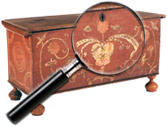Alfred Jenks & Son, of Bridesburg and Philadelphia, Pennsylvania, produced 98,464 of these Model 1861 percussion rifles for the federal government during the Civil War, one of the largest armsmaking contracts of the war.
|
|||||||
|
Historical Weapons – A Specialist’s Primer Abridged from Mr. Wiley’s Sword’s comments in the James Julia Auction catalogue for the sale of his collection. Historically identified weapons are among the most significant artifacts of the American past. They are also among the rarest. It is estimated that less than one per cent of antique (pre-1898) collector arms have significant identification as to their contemporary period usage. Typically inscribed, or documented by valid means to [...] Click here to continue reading. The Henry Rifle, named after its designer, B. Tyler Henry, is one of the scarcest and most sought after Winchester rifles of any period. About 14,000 of these Civil War era rifles were produced between 1860 and 1866. Serial numbers began at #1 and most often found at top of the breach end of the barrel, marked “Henry’s Patent. Oct 16, 1860/Manufact’d by the New Haven Arms Co., New Haven, Ct.” The Henry rifle [...] Click here to continue reading. Gutta Percha Gutta percha is defined as a tough plastic substance made from the latex of several Malaysian trees (generally Payena and Palaquium) of the sapodilla family that resembles rubber but contains more resin, and is used especially as insulation and in dentistry. Jacob Ernst Jacob Ernst is listed in the Frederick County, Maryland 1790 census and deed dated 1811. Later listed as gunsmith in 1810 tax roll of Paradise Township, York County, Pennsylvania. Re: Gunsmiths of York County PA, Whisker, pg. 7; Thoughts on the Kentucky Rifle, Kindig, pg. 357. The Edo Period The Japanese Edo period is also known as the Tokugawa period. It is a division of Japanese history running from 1603 to 1867. The period marks the governance of the Edo or Tokugawa Shogunate which was officially established in 1603 by the first Edo shogun Tokugawa Ieyasu. The period ended with the Meiji Restoration, the restoration of imperial rule by the 15th and last shogun Tokugawa Yoshinobu. The Edo period is [...] Click here to continue reading. Blunderbuss The blunderbuss is a now obsolete musket with a short barrel having a flaring mouth. The gun fired a large amount of shot designed to inflict maximum damage at short-range. It was intended for use wherever close-in work was required, as by coach guards or sailors repelling boarders. The term blunderbuss first appeared in 1654 and is of Dutch origin, being a combination of donder (thunder) and bus (pipe or tube). Seventeenth and [...] Click here to continue reading. The Colt Single Action Army Revolver This is one of the most famous guns of all time. The Army contracted and carried it thoughout the Indian Wars and it is associated with the most famous lawmen and infamous outlaws on the frontier. It was often known as the “Peacemaker”, “Frontier Six-Shooter”, and the “Equalizer”, among others. Production of this revolver began in 1872 and variations continue to be produced today. Collectors divide its history [...] Click here to continue reading. Norris made several thousands of these muskets under contract to the state of Massachusetts in 1863 and 1864. Memphis Novelty Works Swords The Memphis Novelty Works was the firm of Thomas Leech, and was organized in Memphis, Tenn. about September, 1861 to manufacture “army cutlery.” Along with Charles Rigdon, Leech produced various pattern swords at Memphis until about May 1, 1862, when, due to the danger of that city being captured, the firm moved to Columbus, Mississippi. Thereafter the firm was known as the “Novelty Works/Leech & Rigdon.” |
|||||||
|
Copyright p4A.com, ltd. & Internet Antique Gazette - 2026 - All Rights Reserved |
|||||||
